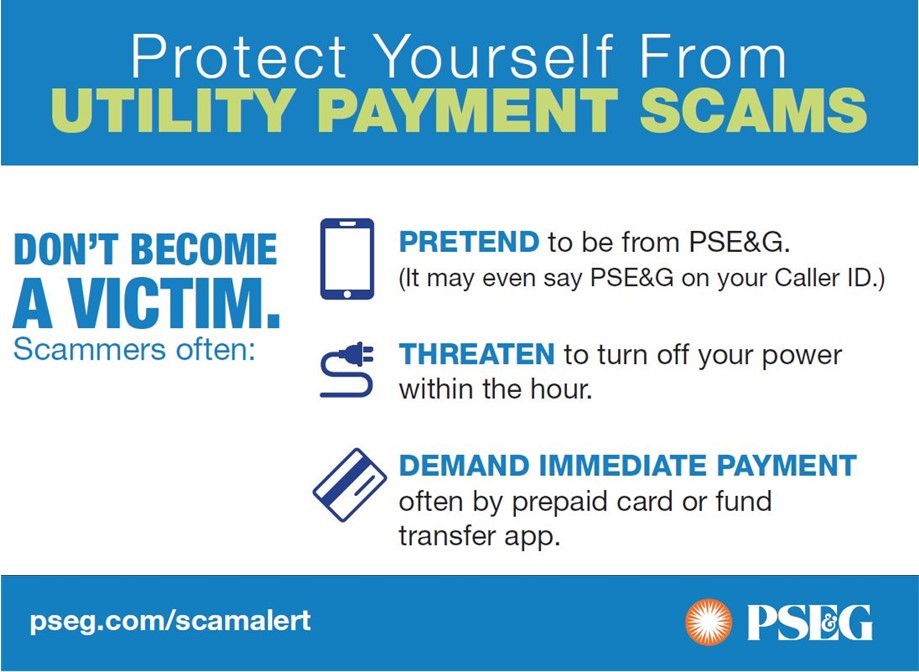Learn the Telltale Signs of a Utility Scam
PSE&G urges customers to think twice if someone
threatens to immediately shut off their power

PSE&G urges customers to be alert to utility scams – particularly scams demanding immediate bill payment. PSE&G continues to educate customers on how they can guard against becoming victims of impostor utility scams.
“Protecting our customers is a top priority. It is critically important we continue to raise awareness and educate customers about how to spot and stop potential scams,” said Jane Bergen, director of billing, Customer Care for PSE&G. “Scammers continue to adapt and develop increasingly sophisticated tactics to take advantage of our customers.”
Scammers continue to use calls, texts, emails and in-person tactics to contact utility customers often asking for immediate payment to avoid service disconnection. PSE&G would not send just one notification to a customer within an hour of a service disconnection. The company will also never ask customers to make payments with a prepaid debit card, gift card, any form of cryptocurrency or third-party digital payment via fund transfer applications. PSE&G offers a variety of payment options and would never require one specific type of payment.
Recent phone scams reported to PSE&G include demands for payment for past-due bills or priority meter installations. Often scammers will threaten to disconnect electric service if payment is not made immediately.
If a customer has doubts about the legitimacy of a call or an email — especially one in which payment is requested — call the company directly at 1-800-436-PSEG (7734).
Signs of potential scam activity:
- Threat to disconnect: Scammers may aggressively tell the customer their utility bill is past due and service will be disconnected if a payment is not made — usually within an hour.
- Request for immediate payment: Scammers may instruct the customer to purchase a prepaid card, a gift card or even Bitcoin, and then to call them back to make a phone payment. Scammers may request that the customer use a payment app to make an online payment, or even give instructions for an in-person meeting. Many times after the customer makes the first payment, the scammer will call back to ask for the payment to be resubmitted due to an error with the amount. The scammer refers to a new amount and claims that the original payment will be refunded.
- In person-demands: Scammers may arrive at a home or business, flash a fake ID and/or claim to be a utility collection representative. The impostors may wear “uniforms” or affix false company signs to their vehicles. The scammers generally ask for personal information or offer discounts, which a real PSE&G representative would not do.
- Request for card information: If a customer calls back with requested information, the scammer asks the customer for the prepaid card’s number or gift-card PIN, which grants the scammer instant access to the card’s funds, and the victim’s money is gone.
Protect yourself against scams:
- Be alert to the telltale sign of a scam: someone asking by telephone or email for payment in pre-paid debit cards or a MoneyGram transfer, or to send money to an out-of-state address.
- Never arrange payment or divulge account or personal information, including Social Security numbers or debit or credit card information, over the telephone unless you are certain you are speaking to a PSE&G representative.
- Customers should also know what PSE&G will and won’t discuss over the phone. A genuine PSE&G representative will ask to speak to the “Customer of Record.” If that person is available, the representative will explain why they are calling and provide the account name, address and current balance. If the person on the phone does not provide the correct information, it is likely the customer is not speaking with a PSE&G representative.
- If the “Customer of Record” is not available, the PSE&G representative will not discuss the account at all and ask that a message be left for the “Customer of Record” to call 1-800-436-PSEG (7734).
- If a customer has doubts about the legitimacy of a call or an email — especially one in which payment is requested — call the company directly at 1-800-436-PSEG (7734).
For more information on various payment scams reported in the PSE&G service area and around the country, visit pseg.com/scamalert.
|


 Robbinsville Careers
Robbinsville Careers